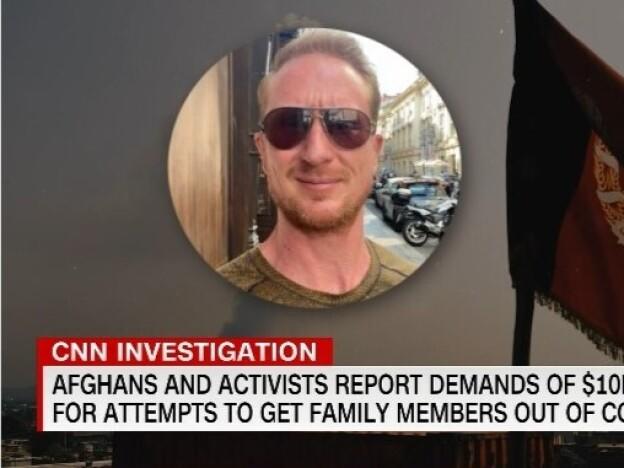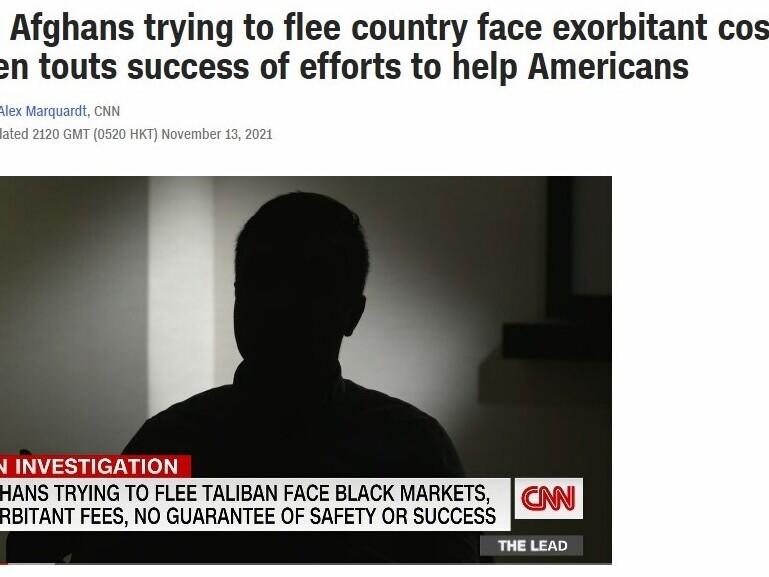Section Branding
Header Content
CNN goes on trial over its report alleging 'black market' for Afghan rescues
Primary Content
After the Taliban took control of Afghanistan in August 2021, many people were desperate to flee the country. CNN reported that a security consultant was among those offering to evacuate them — for a price — as part of an investigation into claims of "black market" rescue operations.
CNN's story, which aired on Nov. 11, 2021, showed a photo of Zachary Young, head of Florida-based Nemex Enterprises. The caption below warned of "exorbitant fees" and "no guarantee of safety or success." Chief national security correspondent Alex Marquardt told viewers that CNN could not confirm that Young had successfully evacuated anyone who had paid him to leave the country.
Young has sued CNN for defamation. In his complaint, his attorneys say CNN gave him just hours to respond to its questions before it first aired that story on The Lead with Jake Tapper. They say Young had, in fact, successfully evacuated dozens of people from Afghanistan.
In rebutting those allegations in court, CNN has since cast doubt on Young's claim of the successful evacuations. Behind the scenes, however, some editors expressed qualms about the reporting, court filings show.
The trial kicks off Monday in the Florida Panhandle, a deeply red part of the country, at a time when public perceptions of the media are increasingly ideologically polarized and the incoming president, Donald Trump, has made political and legal attacks on the press part of his regular repertoire.
Just last month, Trump settled the defamation case he had filed against ABC News — also in Florida. It focused on anchor George Stephanopoulos' repeated characterization of Trump as being found liable for rape. In fact, the New York jury had found Trump liable for sexual abuse and defamation. It had declined to find Trump liable for rape.
The network's parent company, Disney, agreed to make a $15 million donation to a future Trump foundation and pay $1 million toward Trump's legal fees to resolve the suit. Many legal observers thought Disney would have been likely to prevail in court.
On-air apology fails to satisfy
Young's attorneys say he is a logistics and security expert who helped U.S. and European corporations and nongovernmental organizations extract people from Afghanistan during a dangerous time. His lawsuit alleges that CNN unfairly implied on the air and online through a subsequent written story and social media posts that he was profiting from illegal tactics. And in his legal complaint, his lawyers write that Young's business has lost millions of dollars in revenues as a result of the hit to his reputation.
Four months after the initial broadcast, as Young's lawyers demanded a retraction, CNN offered a correction on Tapper's show. A substitute anchor told viewers that the term "black market" should not have been used in the story at all and that the network "did not intend to suggest that Mr. Young participated in a black market." The anchor, Pamela Brown, concluded by telling viewers: "We regret the error. And to Mr. Young, we apologize."
The TV version of the story was taken down. Although Tapper was deposed under oath, no materials that have become public suggest that he had a hand in the story's preparation or vetting.
In a statement to NPR, a CNN spokesperson said, "When all the facts come to light, we are confident we will have a verdict in our favor." The network has argued in court papers that reporters were pursuing a story that reflected Afghans' concern that security consultants, including Young, were charging far more than they could afford to escape the country. It contends that many of the characterizations are opinions rather than factual claims. CNN also says the network has since learned more about Young that undermines his credibility.
"At the time of its reporting, CNN knew little about Young's financials, his model, or whether he'd successfully evacuated anyone because whenever anyone [including CNN] asked Young to explain his business, he obfuscated, behaved unprofessionally, lied, and hid," CNN's lawyers say.
They assert that Young "largely refused to cooperate with CNN's reporting efforts, providing little in the way of information and, in many cases, providing false information."
"CNN has since learned, through discovery in this case, that Young's operation was very different from how he publicly portrayed it," CNN's legal team wrote in a motion filed in August. "He never planned any evacuation or created any evacuation procedures."
Young's lead attorney, Devin Freedman, counters that the case represents "a critical inflection point for anyone who values journalism."
"It offers a chance for the media to reorient itself toward accuracy, accountability and renewed public trust — righting the ship on the misinformation and sensationalism that undermines Americans' commitment to the truth," Freedman wrote to NPR.
CNN editors worry about the story
The story presented two Afghans who wanted to get relatives out of the country; the identities of each were hidden to protect the safety of their families. One, who was living in California, was shown in silhouette; the face of the other, interviewed by Skype in Kabul, had been digitally obscured. Each said they had sought people who could help and found it would cost tens of thousands of dollars.
Marquardt then says one of the Afghans found Young online. He says Young communicated with potential customers through LinkedIn. In one exchange, he said it would cost $75,000 to evacuate a vehicle with five or six passengers from Kabul to Pakistan. Young asks if the potential customer has a corporate sponsor and cites companies including Audible and Bloomberg as clients.
In the story, CNN flashes the LinkedIn messages on the screen. The caption below reads "AFGHANS TRYING TO FLEE TALIBAN FACE BLACK MARKETS, EXORBITANT FEES, NO GUARANTEE OF SAFETY OR SUCCESS."
Young is the only contractor named in the story.
Young's complaint says that his LinkedIn post is targeted toward groups with the funding to pay for evacuations. His attorneys say he does not seek to extract money from desperate individuals.
As internal CNN exchanges released in court documents show, editors at the network harbored doubts about the report. In one exchange, a senior editor signaled his concerns.
"Tell me if I'm wrong," Tom Lumley, CNN's senior national security editor, wrote privately on Slack to a colleague on the evening of Nov. 12, 2021. It was the day after the television segment aired, but before the written piece was posted online. "I think the Alex [Marquardt] story is a mess."
Lumley appeared to suggest that the network post the video without a written version: "I just want it to live as a TV piece and they can program the video. I'm not even sure it's easily salvageable."
Megan Trimble, a senior breaking news editor, replied: "No, it's messy."
"I'd tell you if I thought we should put [it] up," Trimble wrote, "but it has some very sweeping claims up top without the details clearly showing what's going on."
Lumley responded, "We can't say whether these people are con artists or not," calling the story "incomplete."
Trimble wrote, "I can see why it could make a quick hit video." Lumley shot back, "Needs more reporting." Trimble responded, "it's not fleshed out for digital."
The written piece was posted a day later.
It is not clear from the publicly available evidence how extensively the posted story was edited following those exchanges.
Yet Young's attorneys argue that CNN drew a distinction between the journalistic care given to video pieces and written articles.
They also contend that the network did not follow its typical procedures in approving the story.
Court documents reflect that several CNN editors privately noted that the process for evaluating the story's accuracy, fairness and context prior to broadcast or publication bypassed the inclusion of editors with knowledge of related national security matters. "Obviously this isn't how it's meant to work," wrote Allison Hoffman, the executive editor of CNN Politics, according to court documents.
According to court filings, Marquardt, the lead reporter, messaged an assistant managing editor, "We gonna nail this Zachary Young mf*****." The editor, Matthew Philips, who holds responsibilities for enterprise reporting and editorial standards, shot back: "gonna hold you to that cowboy!"
Separately, a CNN producer, Michael Conte, wrote to Marquardt that Young had "a punchable face"; Marquardt's reporting colleague, Katie Bo Lillis, called Young expletives at least twice.
Legal observer: CNN should "admit you're wrong"
The exchanges that have become public through the litigation are, by definition, incomplete and may not convey full context. But they are red flags, legal observers say. University of Florida law professor Lyrissa Lidsky calls them "damning."
"The internal communications certainly make it sound as if the main journalist on the story wanted to ruin the plaintiff, and that there were reasons to believe that ... he was overplaying their hand factually," Lidsky, who specializes in First Amendment law, tells NPR in an email.
"My advice to CNN would be to cough it up. Settle," says Charles Glasser, former global media counsel for Bloomberg News. "Admit you're wrong. Admit your hyperbole was out of line, and move on."
The sufficiency of the CNN apology in March 2022 will be among the questions at issue during the trial. A Florida appeals court ruled that Young is entitled to seek punitive damages should a jury find CNN liable for defaming him. The presiding circuit court judge, William Henry, dismissed Young's company, Nemex, as a plaintiff, because the story never named it.
The judge ruled that Young is not a public figure. If he were, his legal team's burden of proof would be far higher, showing the reporters knew or had reason to know what they were publishing was false and harmful. (The two outside legal observers interviewed by NPR for this story suggested that might be a matter for appeal if CNN loses.) As it is, Young's attorneys must convince the jury that CNN was negligent in failing to nail down the facts.
Correction
An earlier version of this article said that CNN anchor Jake Tapper presented an on-air correction for using the phrase “black market” in the network’s story in dispute. In fact, it was a substitute anchor.


